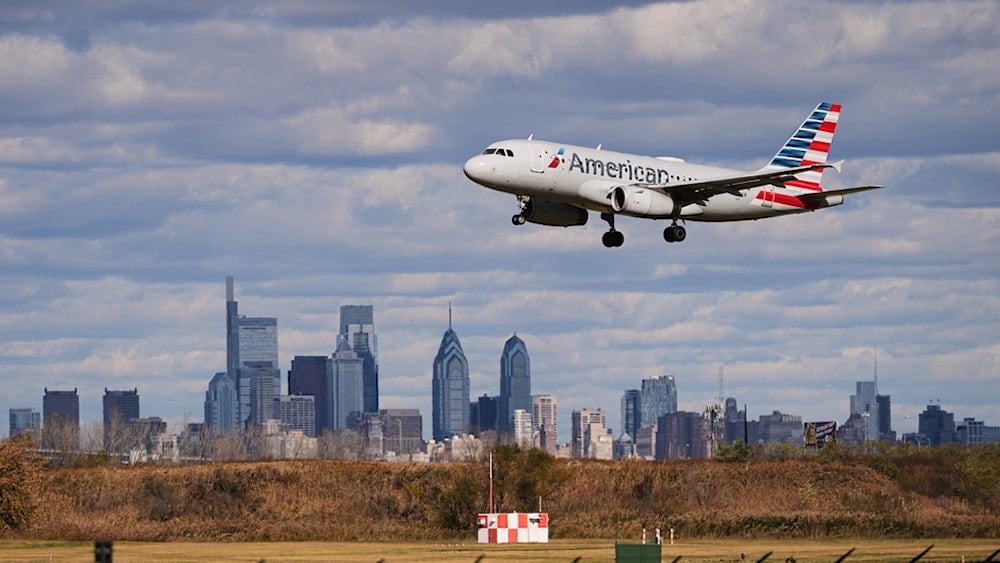Judge criticizes DOJ as Boeing avoids prosecution over 737 MAX crashes
A US judge approved dismissing the Boeing criminal case over the 737 MAX crashes but criticized the decision, saying it fails to ensure safety accountability.
-

An aircraft lands at Philadelphia International Airport in Philadelphia, Thursday, November 6, 2025 (AP)
A US federal judge has approved the Justice Department’s request to dismiss a criminal case against Boeing over the two fatal 737 MAX crashes that killed 346 people, allowing the company to avoid prosecution, while sharply criticizing the government for its decision.
Judge Reed O’Connor of the US District Court for the Northern District of Texas said on Thursday that although he disagreed with the Justice Department’s approach, he had no legal authority to block the dismissal. The case stemmed from Boeing’s role in the 2018 and 2019 crashes in Indonesia and Ethiopia, which led to one of the deadliest aviation safety scandals in commercial history.
O’Connor reiterated that, in his view, “Boeing’s crime may properly be considered the deadliest corporate crime in US history.” He said the government’s deal “fails to secure the necessary accountability to ensure the safety of the flying public” but acknowledged that prosecutors retain broad discretion over whether to pursue charges.
Boeing avoids guilty plea requirement
Boeing had agreed last year to plead guilty to a criminal fraud conspiracy charge, but a final agreement stalled after O’Connor questioned a provision requiring the Justice Department to consider its “commitment to diversity and inclusion” when selecting an independent monitor to oversee the company.
After the Trump administration took office, the Justice Department reversed its position and dropped the guilty plea requirement entirely.
Had Boeing entered a guilty plea, it risked restrictions on securing major federal contracts with US agencies, including the Defense Department and NASA. Government agencies could have waived those restrictions, but the plea would have carried significant legal and reputational consequences.
Families of victims to file appeal
Relatives of crash victims strongly opposed the agreement, arguing Boeing should face prosecution and independent monitoring rather than being permitted to appoint its own compliance consultant. An attorney for the families said they would file an appeal “immediately".
O’Connor noted that the government’s justification appeared inconsistent over time, writing that Boeing committed crimes “sufficient to justify prosecution” and failed to correct its actions under previous oversight arrangements.
The Justice Department rejected the judge’s criticism, saying the agreement would “provide finality for the victims and requires Boeing to act now,” calling it “the most just outcome.”
Boeing said it would comply with the agreement, stating that it remains committed to improving safety, quality, and compliance across the company.
Financial penalties, oversight
Under the agreement, Boeing will pay $444.5 million to a victims’ compensation fund, $243.6 million in penalties, and over $455 million to strengthen internal safety and oversight systems
The Federal Aviation Administration separately proposed a $3.1 million fine in September for safety violations, including issues tied to the January 2024 Alaska Airlines mid-air emergency involving a 737 MAX 9.
The original 2021 settlement reached during the first Trump administration included a $2.5 billion package: $243.6 million in criminal charges, $1.77 billion in airline customer compensation, and $500 million for victims’ families.
At the time, it was heavily criticized for allowing Boeing to avoid prosecution despite internal communications that revealed knowledge of serious safety issues before the crashes occurred.
Boeing’s safety woes continue to mount
The 737 Max program has become a symbol of Boeing's broader safety and compliance crisis. In January 2024, a door plug on an Alaska Airlines 737-9 Max blew out mid-flight, prompting the Federal Aviation Administration (FAA) to ground all planes of that model.
The incident further fueled accusations that Boeing had failed to meet the obligations set forth in the 2021 agreement.
Following the Alaska Airlines event, federal prosecutors alleged that Boeing had violated the terms of its original deal by not implementing a robust ethics and compliance framework to prevent fraud.
Families of Boeing 737 crash victims urge judge
The families of some of the 346 victims killed in two fatal Boeing 737 Max crashes demanded in August that the US judge handling the lawsuit reject the planemaker’s proposed plea deal with the US Department of Justice, proposing that the government set a higher fine.
In July, Boeing and the US government finalized a plea deal involving the planemaker admitting to conspiracy to defraud the United States. As part of the plea deal, Boeing will pay a fine set between $243.6 million and $487 million and will be subject to oversight by an independent monitor for three years.
The two tragic crashes occurred in Indonesia in 2018 and Ethiopia in 2019, both linked to a flight-control system about which Boeing was accused of misleading regulators. In 2021, Boeing reached a $2.5 billion settlement that included the same $243.6 million fine and commitments to comply with specific conditions.

 5 Min Read
5 Min Read








